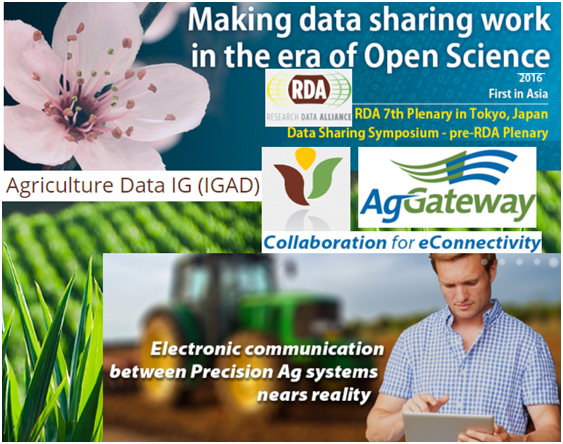AgGateway : expanding eBusiness in Agriculture through eConnectivity

AgGateway is a non-competitive collaborative environment of businesses (formed in 2005 , with more than 240+ member companies) serving the agriculture industry, with the mission to promote, enable and expand eBusiness within and across agricultural sectors. AgGateway was recently presented during the IGAD Pre-plenary meeting, on 28 - 29 February, 2016, at the University of Tokyo.
 eBusiness (e-Business), or Electronic Business, is the administration of conducting business via the Internet. This would include the buying and selling of goods and services, along with providing technical or customer support through the Internet. e-Business is a term often used in conjunction with e-commerce, but includes services in addition to the sale of goods.
eBusiness (e-Business), or Electronic Business, is the administration of conducting business via the Internet. This would include the buying and selling of goods and services, along with providing technical or customer support through the Internet. e-Business is a term often used in conjunction with e-commerce, but includes services in addition to the sale of goods.
With eBusiness as the end goal, making the actual connections/interoperability across computer systems – eConnectivity – is critical to achieving that goal. AgGateway members - involved in all aspects of agriculture and related fields - both establish industry-wide solutions and implement them (along with implementing and extending existing standards ) so that eConnectivity makes eBusiness possible to promote, enable and expand eAgriculture.
Expanding the use of eBusiness is essential to many facets of modern agriculture production, including just-in-time inventory, traceability, sustainability (waste reduction, water management, resource allocation) and efficient use of manpower.
AgGateway enables eBusiness as a means to: improve business processes; help deliver excellent customer service; streamline the supply chain; enhance food safety; support sustainable agricultural practices. To that end, AgGateway provides a number of building blocks of eConnectivity for the agriculture industry, including standards (AgGateway Open Standards; ANSI ASC X12 EDI; Fertilizer Tonnage), guidelines, the AGIIS directory, eConnectivity tools (Sales Reporting File Format), and projects that are furthering the work of implementing eBusiness.
AgGateway has developed a Communications Kit (a number of communications pieces and resources) that can be used by AgGateway members - involved in all aspects of agriculture and related fields - to talk with colleagues and trading partners about the work of the organization.
AgGateway's long-term vision is to become the recognized international source for enabling the use of information and communication technologies for agriculture.
AgGateway collaborative team has been working on projects within seven major industry segments: Ag Retail, Allied Providers (systems & software developers and service providers), Crop Nutrition, Crop Protection, Grain & Feed, Precision Agriculture, Seed. Each segment forms a council that operates autonomously within the overall guidelines of AgGateway. The structure allows the councils to determine their own eBusiness priorities and projects.
In addition to the ongoing work of the councils, some current projects include: Precision Ag Irrigation Leadership (PAIL) Project; Seed Connectivity Phase II (SCII) Project; Crop Nutrient Connectivity (CNC II) Project; Crop Protection Canada Connectivity (CPCC) Project; Paperless Fertilizer Tonnage Reporting Initiative; Standardized Precision Ag Data Exchange (SPADE) Project.
Andres Ferreyra (Ag Connections LLC) presented AgGateway at the Interest Group on Agricultural Data (IGAD) Pre-Meeting (Agricultural Data Interoperability Session) during the 7th Research Data Alliance (RDA) Plenary Meeting. One of the emphasized topics was the SPADE project: the first AgGateway’s field operations effort tackling information interoperability problems.
In 2011 AgGateway identified interoperability in field operations (e.g., planting, harvest) as a major challenge: the multitude of proprietary, incompatible data formats among different machine and implement control systems (MICS), and farm management information systems (FMIS) leads to great frustration among users.

By tackling interoperability issues, SPADE has generally followed an Agile Methodology for each field operation: collect expert-mediated user stories; formalize them into business process models and use cases; identify data requirements; perform gap analyses of existing standards, and propose extensions thereto. A key SPADE outcome was the identification of a set of flexibly-defined common documents that support farm business processes: Crop plan, Observations and measurements (OMs), Recommendation, Work order, and Work record.
SPADE also proposed a system of Reference Data, datasets to distribute across the whole industry so different stakeholders can interpret shared documents the same way. This includes names and identifiers of seed varieties, crop protection products, active ingredients, and so forth. SPADE implemented proof-of-concept (PoC) application programming interfaces (APIs) for machinery and product reference data, and also implemented a PoC index API providing one-stop access to a distributed system of standardized reference data sources hosted by manufacturers and third-party data providers.
Other SPADE contributions include defining concepts such as “OK to Spray”, contributing terms to AgGlossary.org,
.png)
and working with the Agricultural Electronics Manufacturers’ Foundation (AEF) to expand the widely-respected ISO11783-10 MICS-FMIS communication standard’s ability to associate globally-unique identifiers to its own locally-scoped identifiers.
AgGateway’s Allied Providers Council has created a new branding program that allows member companies to promote their use of AgGateway eBusiness resources in support of their products and/or services.

The “Enabled by” logo is intended for use by the company on appropriate materials (e.g., products, websites, communications and marketing materials) in connection with products and services that utilize AgGateway eBusiness resources, such as AgGateway standards, guidelines, the Ag Glossary, and/or the Agriculture Industry Identification System (AGIIS).
On June 13-16, 2016, Bloomington Doubletree, Minneapolis, will host the 2016 Mid-Year working Meeting (registration opens in March 2016!) of the AgGateway focused on making progress on projects currently underway.
If you’re not an AgGateway member and would like more information on membership to join AgGateway projects or suggest others, click here.
If you are interested in using the “Enabled by” logo, please complete the application posted on this page, sign the waiver, and submit your application to Member Services at Member.Services@AgGateway.org.
AgGateway Sales Reporting File Format: Watch the recording of the free, one-hour webinar!
Click here to register and access the recording
Source: AgGateway
See also: Research Data Alliance Seventh Plenary Meeting - 1st to 3rd March 2016, Tokyo, Japan

